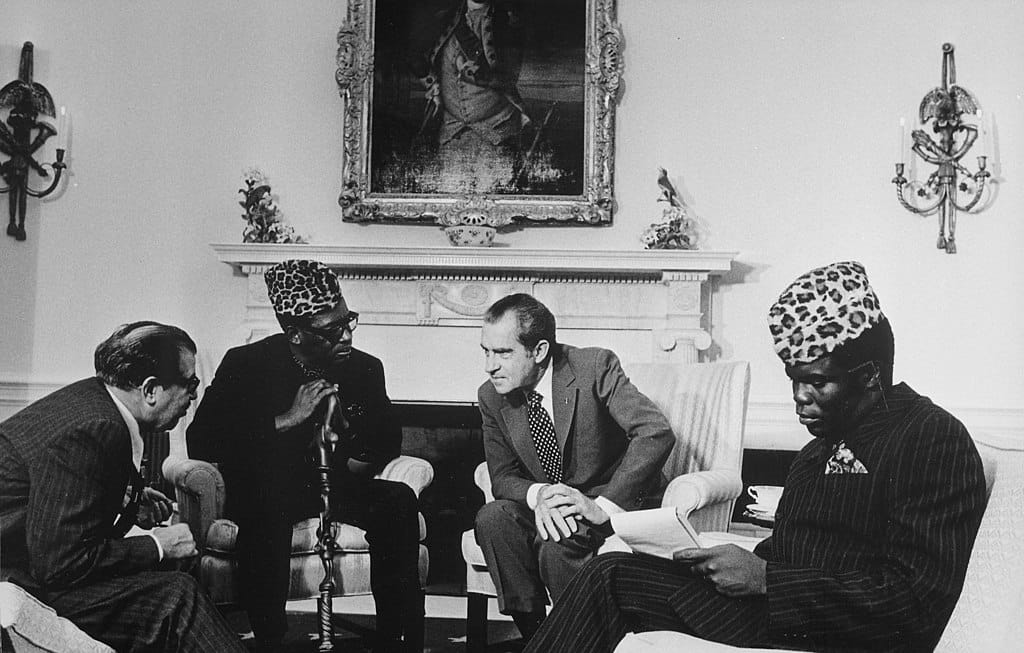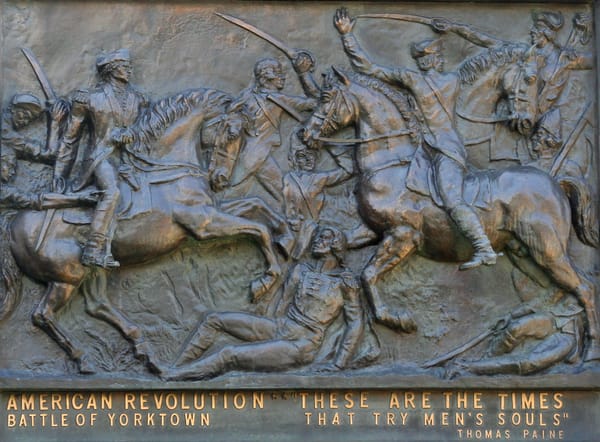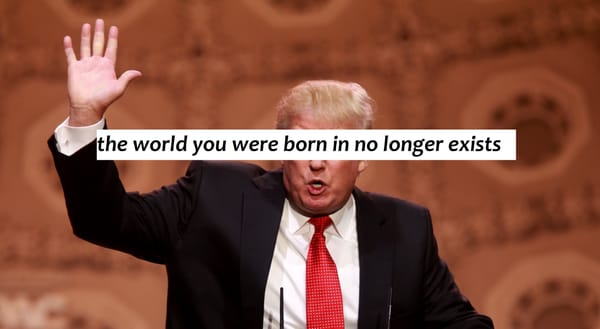What Congo’s Mobutu Sese Seko Teaches Us About Trumpism
Mobutu and Trump both rule by normalizing corruption, not just to enrich themselves but also to cement their own power.

Spend five minutes on social media, and you can find comparisons between Donald Trump and a whole host of authoritarians and dictators. There are comparisons to Mussolini (“Cheetolini”), or Hitler, or for a contemporary figure, Putin. Maybe it helps people to have something to put a name to, something that helps them express their fear of what Trump wants to do. But there is one authoritarian Trump and those around him resemble in disturbing ways: Congo’s Mobutu Sese Seko, who ruled the country from 1965 to 1997.
Mobutu set the standard for what it means to be a kleptocrat. A junior army officer, he joined independence leader Patrice Lumumba’s party. When the Congo became independent in 1960, he joined the government only to see a civil war brew when the Katanga province tried to break away with Belgian assistance. Mobutu wound up capturing his former boss and handing him over to the Belgians and Katangans, who murdered Lumumba.[1] In 1965 with Congo facing another crisis and a potential resumption of civil war, Mobutu seized power in a coup.
There are interesting parallels between the two men. Both have a gift for leading large rallies and drawing crowds (contemporaries of Mobutu recalled that he could hold an audience spellbound for hours while saying nothing of substance). Both embrace authoritarian kitsch: the tackiness of Trump Tower or Mar-a-Lago would fit perfectly with Mobutu’s “Versailles” at Gbadolite. (In sartorial matters, Mobutu has the upper hand over Trump: his leopard-skin hat is a more striking symbol than Trump’s baggy, ill-fitting suits and red tie). Both, as most dictators do, try to harken back to earlier periods of national greatness. Mobutu tried to erase European influences by changing the name of the country to Zaire (itself a Portuguese corruption of nzere o zadi, “river that swallows rivers”) and forcing people to change their names. Trump, as we all know, wants to make America great again: after all, it’s why we have a Gulf of America now.
But where the similarities are really instructive is in financial and economic matters. Both men ruled by normalizing corruption, not just to enrich themselves but also to cement their own power. In doing so, Mobutu remade the Congolese state before ultimately demolishing it. Trump promises to do the same. Their understanding of economics is virtually nil, but this is no obstacle.
Corruption in authoritarian societies is hardly unusual—but rarely is it celebrated publicly. Prominent Nazis used the German state to enrich themselves. Generals in the Wehrmacht were often exempted from paying taxes and the SS stole from the Jews that they murdered. However, the public image they presented was of austerity and civic virtue. Mobutu by contrast was the “Big Man” who lived in opulence. He signaled his power by doing things like chartering a Concorde to fly a 4-meter tall wedding cake for his daughter to his palace or maintaining a villa in every major Congolese city.[2]
He achieved this kind of wealth by transforming the Congolese state into a vehicle for his own personal enrichment. This transformation wasn’t especially difficult. As a formerly colonized state, its economy had been structured around enriching Belgium. Mobutu merely shifted the target. Congo’s incredible mineral wealth, mined and sold abroad through state-run companies like Gecamines, took an enormous cut of their export earnings and deposited them into foreign bank accounts for Mobutu. To keep securing foreign aid year after year, Mobutu’s officials became more adept at hiding and laundering the funds. The result was theft on an absurd scale—in a given year, $150 to $400 million of cash from Congo’s minerals exports simply couldn’t be accounted for.[3] Copper, diamonds, cocoa, rubber: Mobutu had his hands in everything the country ran. His plantations alone were the third-largest employer in the country.[4]
This translated into how he maintained power—he brought everybody into his orbit, even his enemies, so that they were financially dependent on his largesse and in turn implicated in his corruption. His policy of economic nationalization, “Zairianization,” expropriated businesses and land held by foreigners in 1974 and redistributed it to supporters and relatives.[5] In economic terms, it was a disaster. Firms failed because they were given to people who had no idea how to run them. But from a political perspective, it served a purpose: those who got rich owed their loyalty to Mobutu. Government controlled the levers of wealth by determining access, at least for anybody who aspired to anything more than subsistence farming. Historian Fred Cooper referred to this as the creation of a “gatekeeper state.”[6] Over time, it crumbled. The collapse of copper prices in 1974 combined with economic mismanagement nearly broke the whole country, but economic turmoil alone was not enough to dislodge Mobutu. If anything, debt adjustment and foreign aid was just another way to steal.
What this did was to normalize a culture of corruption. In a rally where he was asked about corruption, Mobutu responded “If you want to steal, steal a little in a nice way. But if you steal too much to become rich overnight, you'll be caught.” People followed suit. Diamond production fell by almost 66% officially between 1970 and 1990, but unofficial artisanal diamond mining boomed. Between 30% and 60% of the country’s coffee crop slipped across the border; 90% of its ivory did the same.[7] Copper mining is capital intensive and there was no money left to maintain equipment, so instead the sector collapsed: by 1994, copper production was a fifteenth of what it had been in 1960.[8] Congo, like most European colonies, had built its tax structures around exports. This left them vulnerable as it was to price fluctuations, but theft and smuggling could be even more ruinous because it kicked away the state’s chief means of collecting revenue.
The country lost hundreds of millions of dollars in tax revenue and export earnings, leading to ballooning national debt. Debt relief from the IMF and World Bank just became another tool for patronage. The civil service was bloated because it was a vehicle for building client relationships, but what’s worse is that as time went on, stealing became a necessity. Civil servants went months without being paid, so in order to get by, you had to take bribes. Everything had to be quid pro quo, and the only real path to getting ahead was the informal economy.
This extended to the army as well. Multiple aircraft crashed through the 1970s in the Congolese Air Force, all of them because essential parts had been stripped from the planes.[9] By the 1990s, the national army was setting up roadblocks just to try and shake people down as they passed through; members of the air force stole aviation fuel to resell on the black market.[10] Even Mobutu referred to his army as the “Seventh Scourge,” but keeping them weak and divided had its advantages: as long as the presidential guard was well-paid, he was protected.[11]
Infrastructure crumbled everywhere, even in vital sectors of the economy such as copper mining: there was so much theft that virtually nothing went back into keeping the businesses running. Copper production, the mainstay of the Congolese economy, collapsed by the 1990s. Kinshasa was rocked by riots in 1991 provoked by unpaid paratroopers, but the rioters’ goals quickly turned into stealing what they could, right down to the copper wiring from buildings. They struck again in 1993, killing hundreds of people and murdering the French ambassador. By the time that Mobutu was finally driven from power in 1997, Congo in many ways was a failed state: there were few roads to drive on, electricity could wink out if you even got it, and people had to steal in order to survive.
We can already see the corrosive effect that corruption has had in the United States. In 2016, Trump’s refusal to disclose his tax returns was seen as a tremendous violation of presidential norms. Refusing to divest himself of his businesses and investments was an issue in 2017; it barely registered in 2025, even with Trump launching his own memecoin while also in a position to regulate cryptocurrency. Trump charges million-dollar-a-head dinners at Mar-a-Lago right now, and it’s not even clear where the money is actually going.
But Trump wants to go a step further—he’s working to remake the United States into something like a gatekeeper state. He wants to be the Big Man, dispensing favors that cement his position as the power broker. Government spending is already being transformed to reward his supporters. Musk has been the most conspicuous beneficiary, with Starlink and Tesla picking up government contracts that might have gone to others, but those likely only are the most conspicuous examples. Trump’s ideas about tariffs are about as well thought-out as Mobutu’s plans for Zairianization (and will inflict a similar level of harm), but they allow him to do one thing: force industries to come to him and beg for exemptions.
Of course, as with all comparisons and analogies there are limitations, and comparing the two countries is fraught. Congo was a recently-independent state based around resource extraction whereas the United States is still the largest industrialized economy in the world. Trump cannot hijack the entirety of the U.S. economy, but in trying he can wreak tremendous amounts of harm. Widespread trade wars deepen the risk of a global recession or even depression, but if it’s done in a way that deepens Trump’s control over sectors of the economy, it may not be a defeat for him. Similarly, Trump’s determination to gut the IRS while passing a massive tax cut comes right as the U.S. government once again has to fight over the debt limit. The U.S. has its own unique vulnerabilities, all of which are being stressed by the normalization of theft from the public, and all as essential civil services are being gutted.
It’s cringe to write about civic virtue, I’ll freely admit it. But the collapse of civic virtue makes good governance impossible: once people see that their government steals what it wants and lets basic services fall apart, they have every reason to steal for themselves. Putting that social contract back together is incredibly difficult; Congo may no longer be Zaire, but Mobutu’s demolition of the country helped lock it into a cycle of wars that it is still trying to pull itself out of. The division in the Trump Administration between the Christian Nationalists and those who just want to treat the whole country as a smash-and-grab is setting the United States on a ruinous path. Any useful opposition to Trump has to foreground civic virtue and responsibility.
[1] Fred Cooper, Africa Since 1940: The Past of the Present, Cambridge University Press: New York, NY, 2002, 248.
[2] David Van Reybrouck, Congo: The Epic History of a People, Harper Collins: New York, NY, 2014, 409.
[3] Steve Askin and Carole Collins, “External Collusion with Kleptocracy: Can Zaire Recapture Its Stolen Mineral Wealth?”, Review of African Political Economy, No. 57, 1993, 78.
[4] Reybrouck, Congo, 357.
[5] Reybrouck, Congo, 357.
[6] Cooper, Africa, 237.
[7] Reybrouck, Congo, 389.
[8] Michela Wrong, In the Footsteps of Mr. Kurtz: Living in Mobutu’s Congo on the Brink of Disaster, Harper Collins: New York, NY, 118.
[9] Reybrouck, Congo, 370.
[10] Godefroid Murzalia et al., “Roadblocks ‘at the rhythm of the country’: Predation and Beyond in South Kivu, Democratic Republic of Congo,” 19. Accessed April 20, 2025: https://www.gicnetwork.be/wp-content/uploads/2021/12/08_GIC_Roadblocks_at-the-rhythm-of-the-country_04.pdf.
[11] Crawford Young, The Rise and Decline of the Zairian State, University of Wisconsin Press: Madison, WI, 1985, 248.
Featured image is Meeting in the Oval Office between Nixon and President Mobutu Sese Seku of Zaire, by Jack Kightlinger




